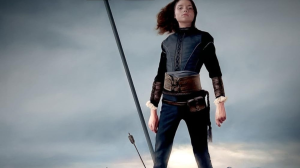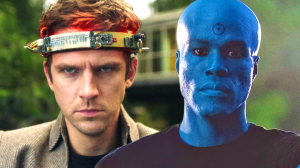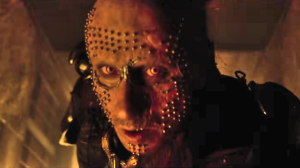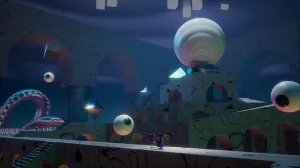
Earlier this month, DC released the hardcover original graphic novel Six Days through their Vertigo imprint. The book, from writers Robert Venditt and Kevin Maurer with artist Andrea Mutti, centers on a group of American paratroopers in World War II, who were mis-dropped as part fo the D-Day campaign and ended up living in a small French village for the titular six days until the Germans came and the quiet little town erupted into war. One of the paratroopers who died during the ensuing combat was Venditti’s uncle, and the whole story was inspired by some old family documents that he came across.
Videos by ComicBook.com
While Venditti has some experience writing Nazis, it is only in the theoretical: he is the writer of DC’s Freedom Fighters, a comic that takes place on Earth-X, where the Germans won World War II and are still in control of a wildly different version of the planet. He has little experience writing about the day to day lives of soldiers, which is part of what brought him together with Maurer, who has written some comics, but is best known for books like No Easy Day and No Hero: The Evolution of a Navy SEAL. The pair joined ComicBook.com for a discussion of Six Days, what it means to them, and the importance of getting the story as right as they could.
How did this creative team come together?
Rob Venditti: I’ve known Kevin for a while. I met him at a book festival here in Georgia years prior. I knew some of his work and I once did a comic book signing in Wilmington, NC, and Kevin came by — just a few weeks before that, I had found this letter in my grandmother’s old belongings that had been written home by one of my uncle Tommy’s war buddies, detailing where he had been killed in the war. Up to that point, nobody in my family had ever known what happened to him. They just knew that he jumped out of a plane as part of the D-Day campaign and that he was killed in France, but the circumstances and the location were never known.
I started researching the battle and was overcome by not just the battle itself but the way in which these soldiers were the worst mis-drops of all of D-Day. They ended up in a town and basically lived there for about six days until the Germans came to the town and they had to fight. The way that the paratroopers and the French citizens came together to form a community was a fantastic story in the middle of a giant war. I was talking to Kevin, and he said “That is a fantastic story. Why don’t you do that story?” And I said I would like to, and I know there’s a story there, but I don’t feel comfortable with this kind of material. I write fiction; I’ve never done anything based on real events or anything like that. He started talking to me about all the things about the 82nd Airborne he knows and it occurred to me, why don’t we do this book together? I have the family connection and I can interview my family members to the extent that they knew my Uncle Tommy, who I kind of wanted to make the main character of the book, and Kevin has the journalism background and some military journalism experience so he understands the vernacular and combat and weaponry and ll those things. So we pitched it to DC and they said that they wanted to do it at Vertigo and they wanted to do it as an original graphic novel, which is exactly what we wanted to do.

What was it like writing a story like this as a comic, rather than as a graphic novel, Kevin?
Kevin Maurer: I actually have written a little bit, but nothing like this. This was really a challenge and it was a master class in how to write comics. Working with Rob really showed me the differences between them. I know how to tell a story, but not in the way that he knows how to tell it. One of the revelations for me was location. He taught me how to write for the page breaks so that the page turns don’t reveal things, and I still remember that. What I like about it is, I learned a lot working with Rob on this, paritcularly the writing part of how to tell that story.
And how do you approach writing an actual war comic differently than writing a character like The Punisher?
Maurer: In this story, it’s different because the important part is not really about the combat. It’s the relationship between the paratroopers and the village, and being on the precipice of breaking through into history, and how for the six days that they were there, they really made something special that would be destroyed by the Germans. The characters we’re looking at were citizen soldiers for the most part. They were in the military, this was not their vocation, but they were having to do this until they got out. When we thought about the combat, instead of making it the exciting, action-packed combat like in a Punisher comic, we looked at it like, “how would regular people react to combat?” That’s why we tried to make it more stark and more chaotic, and not really making it romanticized.

That is certainly something that comes through — the idea of war being a frantic din of chaos.
Venditti: There’s a great moment in the book that Kevin wrote, after they’ve encountered a motorcycle patrol and Tommy and Charlie are talking over. And they say, “It isn’t like what I thought it would be. It’s like a car crash. And I don’t know, Kevin, but that sounds like something that a soldier probably said in one of your interviews. And it would never occur to me to explain it like that but it rang as such a true statement. These weren’t some battle-hardened soldiers. My uncle was an elevator operator and now he’s jumping out of a plane over France and he equates combat to something he understands, which is a car crash.
Maurer: Yeah. You’re right, that is something I’ve been told. You know what the situation is, you know what your training is, but you still can’t get out of the way of it.
Exploring trauma and doubt is interesting, since this is World War II. It’s the “good” war. This isn’t like Vietnam or something where we are used to looking at it this way. WW II was a war of heroes.
Maurer: I think we do gloss over the impact that it had on the soldiers returning from the war. I’m working on a book and [in accounts from the time] you start to see the things that you to see now, with the veterans returning from Iraq and Afghanistan with PTSD and survivor’s guilt. There’s a lot of baggage in being in such a heightened state for such a long period of time.
Was it important to depict that — the idea that even the “heroes” come back with baggage?
Maurer: I know guys who are dealing with it, who are struggling to deal with what happened to them, and I also know guys who seem fine and who don’t have any impact from it. I’m not a soldier. I’ve only watched combat. I’ve been in combat zones but I haven’t fired a shot. I don’t understand it fully because I don’t think you can unless you are firing at people who are firing back at you. But I think it’s one of those things where you I’ve seen it impact people so differently that it’s hard to say “what happens is this, what happens is that,” you know? It’s all different.
Do you worry about working on a book like this and having some of the audience reaction be, “Well, this guy never went into combat, so he doesn’t get it?”
Venditti: Yeah, absolutely. That’s part of why I was hesitant to do it in the beginning. What do I know about combat or the military? Most of all, I wouldn’t want to do I tin a way that would somehow inadvertently be disrespectful or cavalier about any of it. Having Kevin there to back me up on this made me feel a lot more comfortable about it. As far as finding an emotional core for the story, it’s very much having that personal connection to it — not because I’d ever met Uncle Tommy because obviously I hadn’t; he died in World War II — but knowing how his loss impacted my grandma and how that rippled out and affected the rest of my family. I tried speaking with the few family members left who were around to have any memory of Tommy, it really makes you think about — here’s a guy who went overseas and sacrificed. He was an elevator operator and now he’s jumping out of plane. He gets killed in combat and there’s very few people that even remember what he looks like or that he ever was here. You could be very sad about that, but there’s also something really honorable in that sacrifice. I wanted to try and capture both of those things by taking what few things we knew about him and trying to extrapolate out how he would respond to the things that happened in this battle.
One of the few things we know from the historical record is that on the last Sunday, the American soldiers were permitted by their commanding officers to attend mass in the French village. Obviously I had no idea if he had gone. Somebody had to stay behind to man their post. But I do know that my uncle was involved heavily with his Catholic Church in NYC, so from that idea came the idea to have him going to church and walking into the church at the same time that, on the other side of the world, my grandma was walking into church at home. It makes you feel like they’re all sort of together, you know? Those kinds of moments and that kind of stuff I don’t think I would have come up with if I didn’t have that personal connection to Uncle Tommy and my extended family.

Most war comics have a lot of action, but in this case Mutti’s focus seems to be largely on body language and expressions and kind of…humanity. Was that a conversation going into it?
Venditti: That’s exactly what we were looking for — to find an artist who can handle the combat as well as a scene in a cafe is exceedingly difficult, so we knew he was that guy. The emotions that he was able to put, from a smile between one paratrooper and another to the way one French villager looks at another…this is a story set in a war but it’s a very human story about two diverse groups of people who have nothing in common coming together and forming a community and looking out for each other for six days. They helped each other and sacrificed for each other greatly and ultimately tragically. There’s something inspiring about that. You need an artist who’s not just going to draw splash pages and combat stuff, but also be able to handle all of the quieter moments.
—-
Six Days is available now in comic stores and mainstream bookstores. You can get a digital copy at Amazon, Barnes & Noble, or ComiXology.








